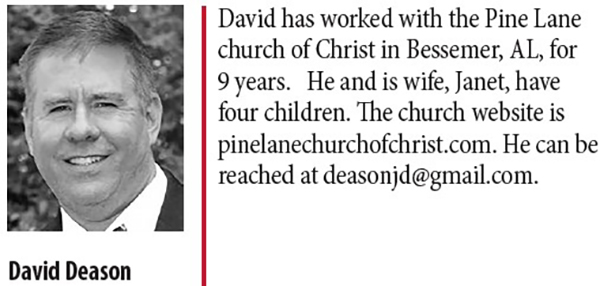
by David Deason
Synopsis: An increasing number of people identify themselves as having no religious affiliation. How should Christians approach helping such lost souls prepare for the day of Final Judgment?
Over the last few decades, the religious world has seen a general decline among its members. For a variety of reasons, people are leaving churches, embracing secularism, and even abandoning their faith in God. This growing number of people have been described by the Pew Research Center, among others, as the “Nones.” Those among the “Nones” are generally divided into one of three subgroups: Atheists, Agnostics, and Nothing in Particular. In December 2017, Pew Research conducted a survey to learn more about this growing category of people. The majority of the group cites “I question a lot of religious teachings” as their primary reason for being unaffiliated, followed by “I don’t like the positions churches take on social/political issues.” When separating the three subgroups, only 8% of the “Nothing in Particular” subgroup claimed “a lack of belief in God” as the most important reason for not having a religious affiliation. This is intriguing! The majority of this subgroup believes in God, but struggles with things that are taught in churches. So how can Christians reach this group of people? How can we help them “connect the dots” concerning the certainty of a future judgment before God, and the necessity of seeking salvation through Jesus Christ?
Although the majority may believe in an idea of God, it is vital that we begin by proving and reinforcing the fact that God is real. Addressing the brethren in Rome, Paul said, “For since the creation of the world His invisible attributes, His eternal power and divine nature, have been clearly seen, being understood through what has been made, so that they are without excuse” (Rom. 1:20, NASB). When one observes the intricate design of the universe, only foolishness would suggest that its existence is nothing more than an accident. Even with the vast technology available today, no one has designed anything as sophisticated, complicated, and special as this earth and the universe in which it is contained. No one would deny the fact that an exceptional design team accomplished an incredible feat of engineering in their work on a modern computer, smart device, or vehicle. The idea that the latest and greatest smart phone was simply an accident where all the parts fell together in just the right place is ridiculous and laughable. So why would anyone make that argument for this world? The only logical conclusion one can reach is that the Hebrew author was correct when he said, “For every house is built by someone, but the builder of all things is God” (Heb. 3:4).
Solidifying the reality of God then leads to teaching that He has not been silent. The Lord revealed Himself to Adam in the garden. Enoch walked with Him. He spoke with Noah. He delivered His law to Moses and the people of Israel. He appointed judges, kings, and prophets. The Lord revealed His will through all of these avenues. God has always wanted mankind to communicate with Him, to know His will and to choose to follow Him. Ultimately, this is the reason Jesus came to the earth—to be the perfect manifestation of God’s desire to commune with humanity. The Hebrew letter opens, “God, after He spoke long ago to the fathers in the prophets in many portions and in many ways, in these last days has spoken to us in His Son, whom He appointed heir of all things, through whom also He made the world” (Heb. 1:1-2).
Modern skeptics seek to minimize and devalue the Bible. However, is it logical to believe in a God who is powerful enough to design and create the entire universe and all it contains, but lacks the power to preserve His words through the years? No! Still, skeptics argue that God did not know what conditions would evolve in the future, and if He were to rewrite the Bible today, He would say things differently and not be as harsh concerning certain topics. Yet, the Lord tells us that “I am God, and there is no other; I am God, and there is no one like Me, declaring the end from the beginning, and from ancient times things which have not been done, saying, ‘My purpose will be established, and I will accomplish all My good pleasure’” (Isa. 46:9-10). When God said, “Let there be light” (Gen. 1:3), He knew everything that would take place from that moment all the way to the end of time, even things yet to happen. Nothing has caught Him by surprise. For this reason, each individual must read His words and decide whether or not to follow Him.
Finally, since God has not been silent, it must be made clear that all people remain personally responsible for their violations of His words. By right of creation, God reserves the power to grant access into His eternal abode or condemn souls to an eternity in hell. Therefore, His words should be viewed as authoritative. He has the right to set the boundary marks in our lives. His commands constitute the standard by which all will be judged in eternity. In modern times, David’s confession to Nathan, “I have sinned against the Lord” (2 Sam. 12:13), has been replaced with a myriad of excuses why sinners should be exempt from the guilt of their sin. However, personal guilt must be recognized before forgiveness can be granted. Repentance is the process by which sinners acknowledge their guilt, turn away from their sinful behavior, and seek God’s forgiveness. Without sinners accepting the responsibility for their own actions, Jesus’s command, “Repent for the kingdom of heaven is at hand” (Matt. 4:17) will never be accomplished, and God’s grace will remain out of reach. Without God’s grace, standing before Him as a sinner in the Day of Judgment will be an extremely sad and frightening ordeal.
“Nones” may have a concept of God, but they must truly come to know and have confidence in God. The way many in the religious world have twisted the Scriptures may be a stumbling-block, but they must see the need to place their confidence in the inspired word and not in man. Hypocrisy seen in churches may dishearten them, but they still must understand the need to accept personal responsibility for their sins, even if others will not, because God will hold each individual accountable. Answers will have to be given. Eternal destiny will weigh in the balance and they must be prepared.
As Christians seek to evangelize, may Paul’s words ever ring in their ears: “Therefore we also have as our ambition, whether at home or absent, to be pleasing to Him. For we must all appear before the judgment seat of Christ, so that each one may be recompensed for his deeds in the body, according to what he has done, whether good or bad. Therefore, knowing the fear of the Lord, we persuade men. . .” (2 Cor. 5:9-11a). 
“Why America’s ‘Nones’ Don’t Identify with a Religion.” Pew Research Center. August 8, 2018. https://www.pewresearch.org/fact-tank/2018/08/08/why-americas-nones-dont-identify-with-a-religion/.
Bible quotations from the New American Standard Bible: 1995 Update. La Habra, CA: The Lockman Foundation, 1995.


